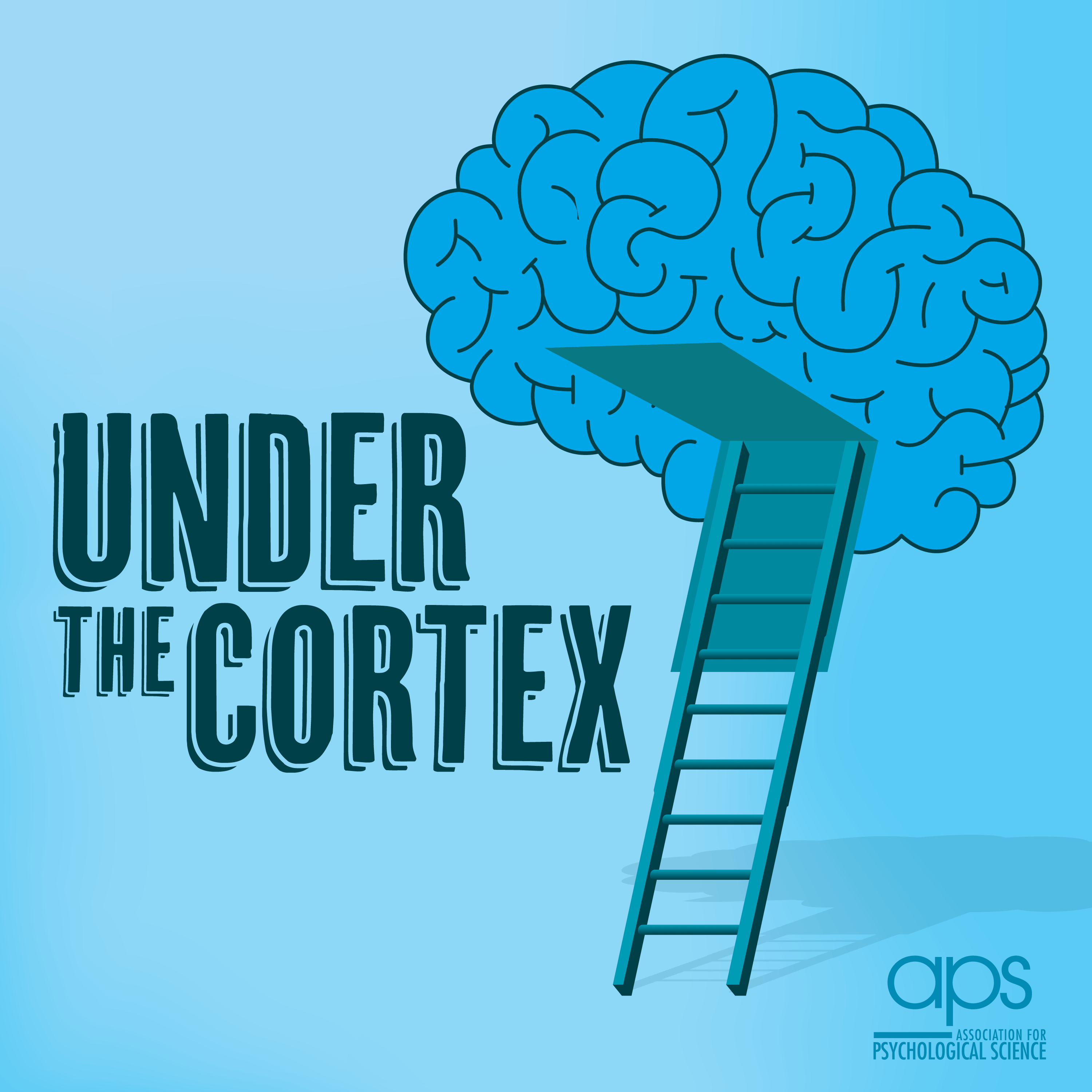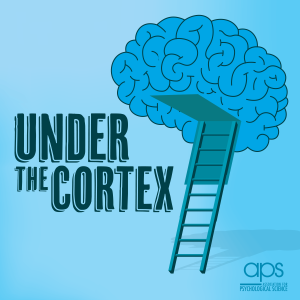
235.7K
Downloads
152
Episodes
The podcast of the Association for Psychological Science. What does science tell us about the way we think, behave, and learn about the world around us? Under the Cortex is proudly sponsored by Macmillan Learning Psychology, where captivating content meets genuine engagement. Our authors, who are seasoned educators, understand today’s teaching challenges. We aim to craft and present both information and interactive tools that truly connect with students. Whether in-person or online, we support instructors and inspire students. Macmillan Learning Psychology: Engaging Every Student, Supporting Every Instructor, Setting New Standards for Teaching and Learning.
The podcast of the Association for Psychological Science. What does science tell us about the way we think, behave, and learn about the world around us? Under the Cortex is proudly sponsored by Macmillan Learning Psychology, where captivating content meets genuine engagement. Our authors, who are seasoned educators, understand today’s teaching challenges. We aim to craft and present both information and interactive tools that truly connect with students. Whether in-person or online, we support instructors and inspire students. Macmillan Learning Psychology: Engaging Every Student, Supporting Every Instructor, Setting New Standards for Teaching and Learning.
Episodes

Thursday Mar 20, 2025
Understanding Addiction: A General Liability or Unique Disorders?
Thursday Mar 20, 2025
Thursday Mar 20, 2025
Is there a single explanation that accounts for all addictive behaviors, or is the reality more complex? How can quantitative classification methods help uncover the nuances of substance dependence?
In this episode, APS's Özge Gürcanlı Fischer Baum speaks with Ashley Watts from Vanderbilt University about her recent research article in Clinical Psychological Science. They discuss how simple explanations to addictive behavior – like the General Addiction Liability theory – may be appealing for a unified treatment approach, but a deeper, more quantitively rich dive into the data draws a more heterogenous picture. The paper argues that addiction follows a more diverse pattern, and the conversation highlights what this approach to addiction means for future research and for treatment strategies.
If you're interested in learning more about this research, visit psychologicalscience.org.
Send us your thoughts and questions at underthecortex@psychologicalscience.org

Thursday Mar 06, 2025
Addressing Selection Bias in Disparities Research
Thursday Mar 06, 2025
Thursday Mar 06, 2025
Psychological research often focuses on disparities, but how do the populations studied impact the reliability of findings?
In this episode of Under the Cortex, Özge Gürcanlı Fischer Baum hosts Wen Wei Loh and Dongning Ren who recently published an article on this topic in APS’s journal Advances in Methods and Practices in Psychological Science. They discuss how non-representative samples can influence study conclusions and highlight solutions for strengthening study validity.
If you're interested in learning more about this research, visit psychologicalscience.org.
Send us your thoughts and questions at underthecortex@psychologicalscience.org

Thursday Feb 20, 2025
Beyond Focus: How Attention Shapes Learning Differently for Children and Adults
Thursday Feb 20, 2025
Thursday Feb 20, 2025
Children often surprise us with the details they remember—sometimes even better than adults! But what if their ability to learn comes not from focus, but from a broader, less selective attention? This episode unpacks research showing that while adults learn best when paying attention, children (ages 7-9) absorb information just as well, even when it’s irrelevant to their task. Could this be the secret behind their incredible learning abilities?
In this episode of Under the Cortex, host Özge Gürcanlı Fischer Baum speaks with Marlie Tandoc from the University of Pennsylvania who recently published an article on learning and attention in APS’s journal Psychological Science. Together they discuss whether children’s weaker selective attention is a hidden strength by addressing findings on attention, memory, and childhood learning.
If you're interested in learning more about this research, visit psychologicalscience.org.
Send us your thoughts and questions at underthecortex@psychologicalscience.org

Thursday Feb 06, 2025
Dosage Dilemma: Unpacking Meditation App Science
Thursday Feb 06, 2025
Thursday Feb 06, 2025
Although meditation apps are gaining popularity, a clear link between usage dosage and intervention outcomes has yet to be established.
In this episode of Under the Cortex, host Özge Gürcanlı Fischer Baum teams up with Simon Goldberg from the University of Wisconsin to explore a critical question: “How does the “dosage” of meditation app use impact mental health outcomes? Drawing from a randomized controlled trial with 662 participants published in APS’s journal Clinical Psychological Science, the conversation examines various ways to measure dosage and how these metrics relate to changes in psychological distress.
If you're interested in learning more about this research, visit psychologicalscience.org.
Send us your thoughts and questions at underthecortex@psychologicalscience.org.

Thursday Jan 23, 2025
The Hidden Cost of Caregiving: Stress, Anxiety and Coping Mechanisms
Thursday Jan 23, 2025
Thursday Jan 23, 2025
As populations age, the need for informal caregivers is increasing. As individuals step up to provide care for loved ones in need, they face their own mental health challenges.
In this episode, Under the Cortex features Michael Kramer from the University of Zurich who recently published an article on this topic in APS’s journal Psychological Science. Özge Gürcanlı Fischer Baum starts the conversation with questions on the mental health decline of caregivers. Kramer highlights that caregiving doesn’t happen in isolation and discusses how contextual factors such as family conflicts and economic struggles play a significant role in the decline of overall well-being.
If you're interested in learning more about this research, visit psychologicalscience.org.
Send us your thoughts and questions at underthecortex@psychologicalscience.org.

Thursday Jan 09, 2025
2024 in Review: 10 Most Popular Articles from APS Journals
Thursday Jan 09, 2025
Thursday Jan 09, 2025
How do the five love languages hold up to empirical research? How do psychological researchers feel about self-censorship? How does gender equality vary by country globally? Tune in to hear highlights from this year’s most popular research.
In this episode, APS's Özge Gürcanlı Fischer Baum and Hannah Brown take turns describing the most downloaded articles in 2024 from APS’s five major journals. Together, they discussed the topics researchers focused on, the findings they uncovered, and the unique approaches to psychological research they employed.
If you're interested in learning more about this research, visit psychologicalscience.org.
Send us your thoughts and questions at underthecortex@psychologicalscience.org

Thursday Dec 26, 2024
Building Bridges: Exploring Cooperation in Children
Thursday Dec 26, 2024
Thursday Dec 26, 2024
When children play, how do they develop the essential skill of cooperation? What methods do they use to solve complex problems while working in teams? How do they approach a threshold dilemma when their personal interests are at odds with the team’s objectives?
In this episode of Under the Cortex, host Özge Gürcanlı Fischer Baum speaks with Patricia Kanngiesser from the University of Plymouth. Kanngiesser, who is a cross-cultural and developmental psychologist, highlights the findings from a recent article in Psychological Science and discusses how children learn to navigate teamwork.
If you're interested in learning more about this research, visit psychologicalscience.org.
Send us your thoughts and questions at underthecortex@psychologicalscience.org.

Thursday Dec 12, 2024
Heart Rates and Step Counts: A Novel Approach to Eating Disorder Care
Thursday Dec 12, 2024
Thursday Dec 12, 2024
What potential do everyday devices, like smartwatches, have in transforming the management and treatment of eating disorders?
In this episode, Under the Cortex explores how commonly used technology, such as heart rate monitors and step counters, can be used to understand binge-eating episodes. APS's Özge Gürcanlı Fischer Baum interviews Qinxin Shi from the University of Utah, whose research is featured in Clinical Psychological Science. Together, they discuss the potential implications of this innovative approach for identifying and treating eating disorders.
If you're interested in learning more about this research, visit psychologicalscience.org.
Send us your thoughts and questions at underthecortex@psychologicalscience.org

Thursday Nov 28, 2024
Midlife-Onset Alcohol Dependence: Causes and Consequences
Thursday Nov 28, 2024
Thursday Nov 28, 2024
What drives the onset of alcohol dependence in midlife? How does it present unique challenges, and what strategies can help when it disrupts the lives of individuals and their families?
In this episode of Under the Cortex, host Özge Gürcanlı Fischer Baum speaks with Lara Khalifeh and Leah Richmond-Rakerd from the University of Michigan, authors of a recent article in Clinical Psychological Science. Together, they discuss the role of aging, life transitions, and retirement as possible contributors to the distinct profile of midlife-onset alcohol dependence.
If you're interested in learning more about this research, visit psychologicalscience.org.
Send us your thoughts and questions at underthecortex@psychologicalscience.org

Thursday Nov 14, 2024
Too Many Connections? How Aging Impacts Memory and Recall
Thursday Nov 14, 2024
Thursday Nov 14, 2024
How does the brain’s memory function change as we grow older? What recent discoveries are helping us understand these changes better?
In this episode of Under the Cortex, Özge Gürcanlı Fischer Baum welcomes Karen Campbell of Brock University to discuss how aging impacts memory. Campbell shares insights from her recent study in APS’s journal Current Directions in Psychological Science, exploring the hyber-binding hypothesis. The conversation delves into how the abundance of connections in older adults’ mental representations may contribute to memory challenges later in life.
If you're interested in learning more about this research, visit psychologicalscience.org.
Send us your thoughts and questions at underthecortex@psychologicalscience.org
